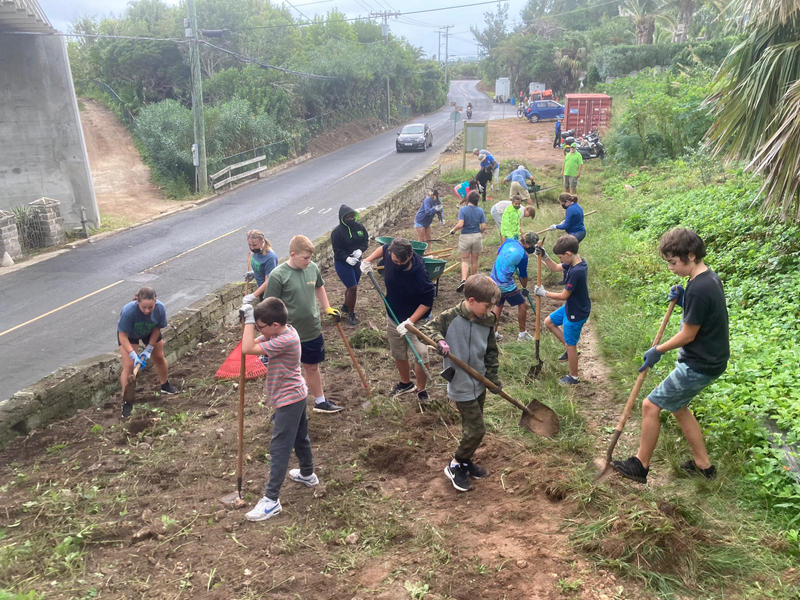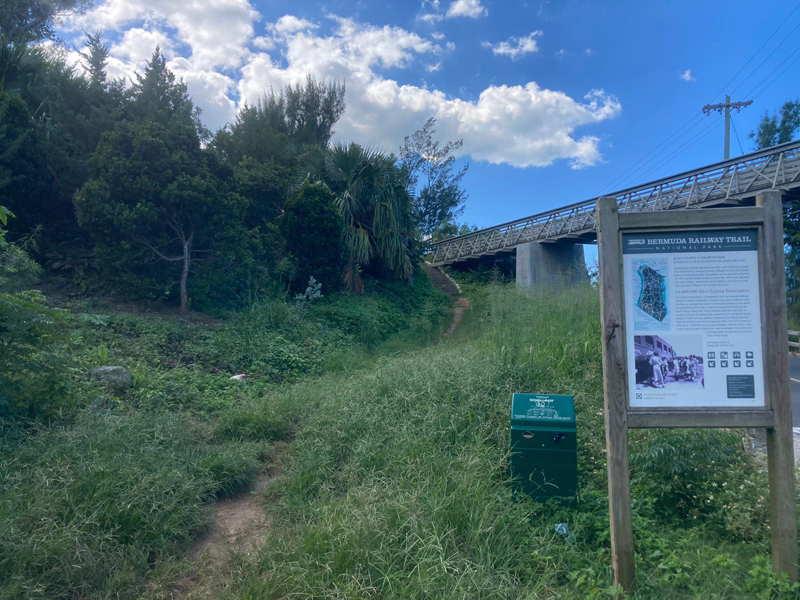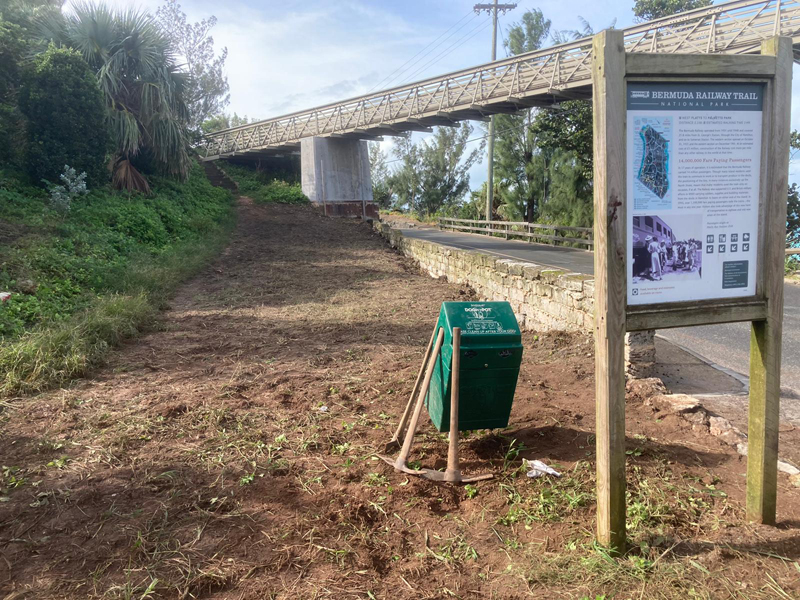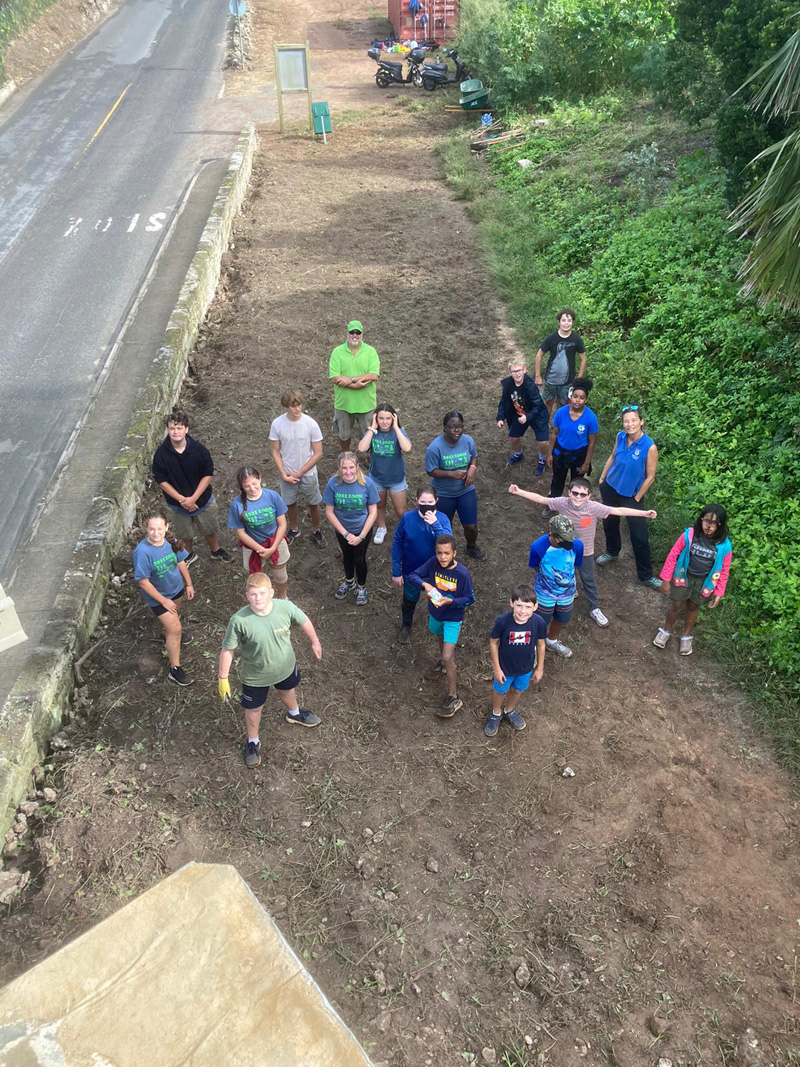Zoological Society Launch Micro Forest Project
The Bermuda Zoological Society [BZS], in partnership with RenaissanceRe, is initiating a pilot project to “promote biodiversity and stewardship of our natural heritage by creating several sustainable micro forests.”
A spokesperson said, “To coincide with the 2021 UN Climate Change Conference [COP26], the Bermuda Zoological Society [BZS], in partnership with RenaissanceRe, is initiating a pilot project for native woodland restoration around Bermuda.
“The BZS Micro Forest Project will kick off by clearing invasive trees and shrubs and planting a landscaped roadside verge of Bermuda native-compatible and endemic trees at a site along the North Shore Road.”
Colin Brown, BZS president, stated, “The BZS tree planting strategy and detailed landscaping plan have been reviewed, ensuring landscaping within the site is acceptable.
“The success of the Trunk Island Living Classroom restoration of native flora and fauna is a great model. Since 2015, casuarinas have been eradicated, and 50% of the island has been restored. In addition, more than 1,250 community and corporate volunteers have contributed 5,742 hours culling invasives and planting 901 natives and endemics.
“Planting trees and enhancing woodland ecosystems can be a highly successful approach that conscientious individuals, schools, organisations, and governments can embrace as they look to combat the challenges of climate change. The BZS pilot project proposes to promote biodiversity and stewardship of our natural heritage by creating several sustainable micro forests”.
A spokesperson added, “BZS staff and volunteers will lead the project with financial and planning support by founding corporate sponsor RenaissanceRe and the Department of Parks. The venture was designed using combined concepts from Dr David Wingate’s life-long reforestation project in Bermuda, recent work by the BZS on Trunk Island, and the Miyawaki Model pioneered by Japanese botanist Akira Miyawaki.
“The Miyawaki Method empowers those who have little space to grow dense urban forests on small patches of land. Considering the diminished space available for afforestation in Bermuda, the BZS is adopting this method for school playgrounds, roadsides, or public parks to simulate a natural forest quickly.”
Dr David Wingate — the Conservation Officer for the Bermuda Government Parks Department from 1966 to his retirement in 2000 — said: “Bermuda is a perfect place to support micro forests and, in fact, already has had decades of success undertaking native woodland restoration projects at Nonsuch in 1962, and more recently, Trunk Island, Walsingham Reserve, Sears Cave, Somerset Long Bay and Pitman’s Pond”.
“Micro forests grow in two to three years and are self-sustaining”, said Dr Wingate, “and communities across Bermuda have already benefitted from the small woodlands we have created over the years. They help lower temperatures, reduce air and noise pollution, attract local birds and insects, and create carbon sinks – anything that absorbs more carbon from the atmosphere than it releases”.
The BZS added, “This new public-private partnership tree-planting project directly supports the BZS mission to inspire appreciation and care of island environments. Creating sustainable micro forests will support local and migratory wildlife and extend experiential learning opportunities for Bermuda students. In addition, this project will demonstrate the benefits of trees, provide an example of conservation of our natural resources, and foster environmental stewardship.”
Mr. Brown said, “The ultimate goal of the pilot project will be to demonstrate that this approach is both sustainable and scalable. Its success will increase the initiative’s scope, enabling the BZS to address tree planting and forest habitat restoration on an island-wide scale, including school grounds.
“The leadership and support of partners like RenaissanceRe mean that we have the funding to ensure the pilot project is successful. It’s a critical project management activity that will show potential and feasibility in real-time, real-world settings before expanding to include more locations, and creating tangible opportunities for all Bermudians to help conserve our precious environment for future generations”.
Jeff Manson, Head of RenaissanceRe Global Public Sector Partnership, said, “Climate change is challenging Bermuda with more frequent storms and hurricanes. Building habitats such as these forests creates highly effective natural barriers while reducing carbon in the atmosphere.
“We look forward to seeing this project in action and encourage everyone to get involved and show their support for this important initiative. RenaissanceRe has long been focused on protecting communities, and we are proud to partner with the Bermuda Zoological Society to help combat climate change and plan for the future of our island”.
Read More About
Category: All, Environment, News







Bravo to BZS for an important project at an important time!